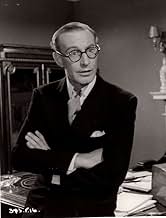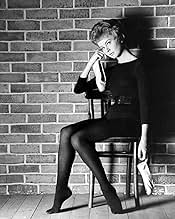Norman Truscott is a store worker who dreams of stardom. Vernon Carew is a singer who's star is fading. Vernon manages to get a recording of Norman singing and passes it off as himself.Norman Truscott is a store worker who dreams of stardom. Vernon Carew is a singer who's star is fading. Vernon manages to get a recording of Norman singing and passes it off as himself.Norman Truscott is a store worker who dreams of stardom. Vernon Carew is a singer who's star is fading. Vernon manages to get a recording of Norman singing and passes it off as himself.
- Director
- Writers
- Stars
Alan Beaton
- Club Member
- (uncredited)
Barbara Bennett
- Lady in Theatre
- (uncredited)
Paul Beradi
- Party Guest
- (uncredited)
Eddie Boyce
- Theatre Patron
- (uncredited)
Richard Caldicot
- Conductor
- (uncredited)
Pauline Chamberlain
- Showgirl
- (uncredited)
- Director
- Writers
- All cast & crew
- Production, box office & more at IMDbPro
Featured reviews
Norman Wisdom plays a labourer who is also a big fan of singer Vernon Carew. He sees Carew perform live, and manages to annoy the singer from his place in the crowd more than once. The final straw comes when Norman stands up and is singing Carew's famous song, trying to get the crowd properly excited (Carew's stardom is definitely waning) - but what comes to pass is that some head honchos hear Norman's wonderful voice, singing Vernon's song, and get the idea for Norman to dub for Vernon on his up and coming record. The general idea is quite similar to that which was used in Singin' In The Rain, but Follow A Star is not quite that good a movie. Still, it is quite good, and the music isn't bad. 7 out of 10.
Being one of the infrequent Norman Wisdom vehicles covered in "Leonard Maltin's Movie & Video Guide" - which he rates a lowly *1/2 - I was wary of this title but, actually, it was quite pleasant if, in no way, a classic!
The very first scene is an inspired one: we see Norman's sweaty face in an atmosphere of overbearing heat (the film was shot by Jack Asher, a talented cameraman best known for his work for Hammer but who also happens to be the brother of the director!) meticulously going about his business thinking he works in a steamship or something, but eventually discovering that what he's doing is simply pressing a pair of pants (a sophisticated style of gag which has been utilized as early as Harold Lloyd's SAFETY LAST [1923]). The plot - a fading crooner 'borrowing' the voice of a naïve newcomer - is simple enough and has been partly lifted from SINGIN' IN THE RAIN (1952).
While the love interest is more sentimental than usual, since Norman's sweetheart is wheelchair-bound and he wants to make it as a singer mainly so as to have the money for her operation, the film provides plenty of amusing situations highlighting the ageing performer (Jerry Desmonde at his most despicable), ebullient elocutionist Hattie Jacques and long-suffering maitre d' John Le Mesurier; a party sequence halfway through the film also features a surprise early appearance by a dark-haired Charles Gray!
The very first scene is an inspired one: we see Norman's sweaty face in an atmosphere of overbearing heat (the film was shot by Jack Asher, a talented cameraman best known for his work for Hammer but who also happens to be the brother of the director!) meticulously going about his business thinking he works in a steamship or something, but eventually discovering that what he's doing is simply pressing a pair of pants (a sophisticated style of gag which has been utilized as early as Harold Lloyd's SAFETY LAST [1923]). The plot - a fading crooner 'borrowing' the voice of a naïve newcomer - is simple enough and has been partly lifted from SINGIN' IN THE RAIN (1952).
While the love interest is more sentimental than usual, since Norman's sweetheart is wheelchair-bound and he wants to make it as a singer mainly so as to have the money for her operation, the film provides plenty of amusing situations highlighting the ageing performer (Jerry Desmonde at his most despicable), ebullient elocutionist Hattie Jacques and long-suffering maitre d' John Le Mesurier; a party sequence halfway through the film also features a surprise early appearance by a dark-haired Charles Gray!
What a wonderful film this is,probably normans best,it has all the hallmarks of mr wisdom from the sad lonely fool to the mad fool!to the sentimental romantic fool that norman pulls off with such natural ease,the plot is good about an ageing pop star played by jerry desmonde trying to revive his flagging career,finds norman, hears his voice and decides to steal it.Hattie Jacques is brilliant as normans vocal teacher but Jerry Desmonde is outstanding in this film,especially when he sings the bath song contorting his body like elvis gone mad!it kept my interest from start to finish.The only slight thing that niggles sometimes, norman very occasionally acts a little too silly where it stops being funny and a little cringing,eg-when hes rolling about on the psychiatrist floor,but normally its kept to the right level.The song 'follow a star'is a enchanting song with a melody that grows on you,incidentally norman wrote this and other songs in this film which further enhances his considerable talents,if you like good comedy,good music and norman wisdom,then this the film to watch.
One of the main plot points of the film is that Norman is afraid to sing in front of anyone, unless his girlfriend is present. And yet the first time we do see him singing it's at the theatre, amidst/in front of an audience, shamelessly upstaging the famous singer who gave him the free tickets in the first place... but his girlfriend couldn't even accompany him because she already had another engagement! Which makes his frequent later complaints that he can't sing because she's not there, ludicrous.
The best thing about the film is the many guest appearances, especially Ron Moody as the doleful violinist. But as far as I'm concerned, Jerry Desmonde is the true star of the film - his television performance of his new hit song is hysterical. But why on earth did Vernon Carew think that Norman's singing voice would revive his career? I can only imagine what Vernon's faithful fans would think of his transition from mellow crooner to sounding - in that particular song - like a cross between Huckleberry Hound and Goofy! (To be brutally frank, I can't believe anyone in the real world would think that was a good singing voice.)
I can't say I'm a huge fan of Norman Wisdom : he's okay in small doses, but quite often his scenes of gurning and capering go on so long they become intolerable. Having an idea of what he was like in real life (thanks to the many TV interviews he gave) it's clear that he had a pretty high opinion of himself and his many talents, and that comes across in his many of his films - especially the later ones where he has more involvement in the writing, staging, and so on.
"Truscott" (Norman Wisdom) spends much of his days at work in a laundry dreaming of a stardom that might just come his way when he encounters legendary crooner "Vernon Carew" (Jerry Desmonde). This man's star is very much on the wain until he hears his new friend sing and hits on the idea of "borrowing" his voice - without telling or paying him, of course. His career rejuvenated, it's only his vocal coach "Dymphna" (Hattie Jacques) who recognises the true owner of the voice but what to do. "Truscott" can only sing if his beloved "Judy" (June Laverick) is there to encourage him and that's not possible right now. As "Carew" heads to the bright lights of the London Palladium, our plucky hero's friends have to think of a way of showing where the real talent lies. How, though? This is another decent showcase for Wisdom to show that he had quite a few strings to his bow. His semi-slapstick comedy timing is perfect but here he proves that he can also hold a tune, delivering a few of the numbers that fit entertainingly into the story. The story itself, though, is far too long. It could readily lose half and hour and not suffer. Indeed were it a tighter production with less meandering, it'd be quite a solid tale that could have better played to Wisdom's strengths, those of writer Jack Davis and the very Rutherford-esque efforts of an on-form Jacques. As it is, it struggles to stay engaging until perhaps the last ten minutes when life is breathed back into it and some laughs are to be had. It's still quite a fun vehicle for it's star and is a perfectly watchable example of his work.
Did you know
- TriviaTony Hatch wrote a song for the film, but Norman Wisdom insisted that he should be allowed to write the theme song. Hatch's song was re-titled and used in "Circus of Horrors (1960)."
- GoofsNorman is talking to the hypnotist at 1:10:00 his lips do not match what the voice over is saying about "like I depend on..."
- ConnectionsFeatured in Norman Wisdom: His Story (2010)
- SoundtracksFollow a Star
by Norman Wisdom
Details
- Release date
- Country of origin
- Language
- Also known as
- Enayiler Kralı Yıldızlar Peşinde
- Filming locations
- Production company
- See more company credits at IMDbPro
- Runtime
- 1h 33m(93 min)
- Color
- Sound mix
- Aspect ratio
- 1.37 : 1
Contribute to this page
Suggest an edit or add missing content






























